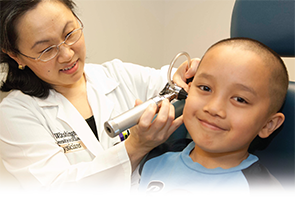Explore This Issue
March 2014
The partial silence suffered by children with unilateral hearing loss (UHL) is too often met with an equal silence from school officials and even caregivers who, in many cases, fail to provide these children with the evaluations and interventions they need to cope with the effects of the hearing disability.
Judith E. C. Lieu, MD, associate professor and associate residency program director in the department of otolaryngology-head and neck surgery at Washington University School of Medicine (WUSM) in St. Louis, said this awareness gap is partly due to outmoded yet persistent attitudes regarding UHL. “This has been going on for decades,” Dr. Lieu said. “It is the dominant attitude in schools, and I still hear it from some pediatricians. ‘Your child has one functioning ear; he or she will be okay,’ they’ll say. Well, we are accumulating enough evidence to suggest that they’re not necessarily okay: They are having difficulty in noisy classrooms, and they often can’t determine where sound is coming from. And so when their teacher calls on them and they don’t answer, or they are asked to put something away and they don’t respond, they’re often labeled as inattentive, slow learners, or worse.”
A 2010 study by Dr. Lieu and her colleagues at WUSM explored the link between UHL and developmental problems in children (Pediatrics. 125:e1348-e1355). The researchers measured speech-language performance in six- to 12-year-old children with UHL and compared the results with a control group of normal-hearing siblings (74 pairs, n=148) given the same tests. Children with UHL had lower scores than their siblings in three main areas of oral language performance: language comprehension (91 vs. 98; P=0.03), oral expression (94 vs. 101; P=0.007), and oral composite (90 vs. 99; P=0.01). Family income below the poverty level and lower maternal education levels were also associated with lower speech-language scores.
Further underscoring the effects of UHL on learning and behavior, the children with the hearing disorder had 4.4 times the risk of requiring an Individualized Educational Plan (IEP)—a sign of difficulty in school—and 2.5 times the risk of requiring speech therapy, the researchers noted.
Based on these results, Dr. Lieu and her colleagues called for rethinking how children with UHL are managed. “The common practice of withholding hearing-related accommodations from [these] children should be reconsidered and studied, and … parents and educators should be informed about the deleterious effects of UHL on oral language skills,” they concluded.
Overall Data
In 2012, Dr. Lieu’s research team continued to explore the interplay between UHL and childhood development by publishing the first study since 1976 to look at the problem using a longitudinal model (Laryngoscope. 2012;122:2088-2095). The study included 46 children with permanent UHL, ages 6 to 12 years, who were tested using standardized cognitive, achievement, and language testing at yearly intervals for three years. The researchers also looked at behavioral issues, as well as the degree to which interventions for UHL were offered to patients, such as IEPs and speech therapy. (By design, none of the children in the study were given any surgical or medical therapy for their hearing loss during the period of observation.)
—Judith E.C. Lieu, MD
The results were a bit of a mixed bag when it came to determining the extent to which UHL adversely affected the study participants’ development. Scores from standardized tests of language skills and cognition increased during the study, indicating that the children had some ability to overcome their hearing deficits, Dr. Lieu noted; however, “school performance [scores] did not show concomitant improvements.”
Leave a Reply